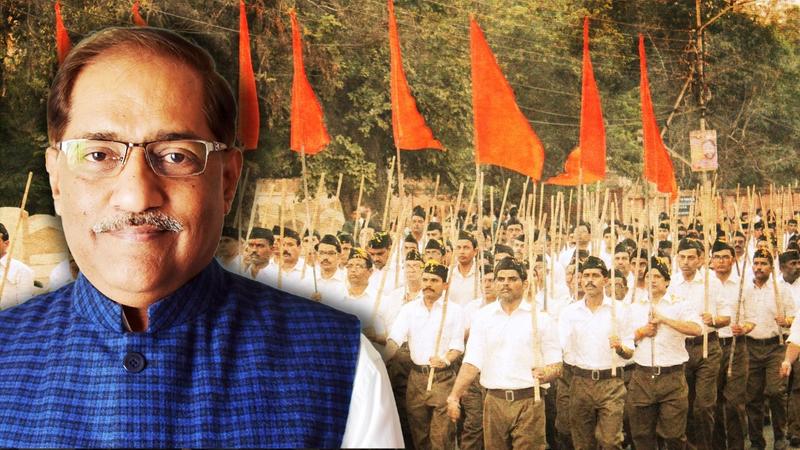Published 18:39 IST, July 7th 2024
Opinion/ RSS @100 – Looking Back, Looking Ahead
RSS is a unique organisational model, which began with an experiment in 1925 with around a dozen youths coming together to play and sing songs in Nagpur.

New Delhi: Rashtriya Swayamsevak Sangh (RSS) is a unique organisational model in the world. The experiment began in 1925 with around a dozen young boys coming together to play and sing songs with a 35 year old doctor, one of the very few at that time in Nagpur. As they played, they learned about patriotism, character building, team building and lessons in brotherhood. This programme, in an open ground, was called a ‘shakha (branch)’ of RSS. This is the powerhouse of RSS and the primary measure of the organisation's growth. This has now grown to 71000 daily shakhas, 28000 weekly and about 12000 monthly gatherings.
The simple idea was to keep some time out of your day every day, beginning with one hour when you don’t think about yourself and your family, but about society. Dr Keshav Baliram Hedgewar had been rusticated from the school for raising the slogan of ‘Vande Mataram’ that was banned by the British, in front of the school inspector. He was not alone but organised all the senior students to defy the British order. He surrendered to the authorities when they could not break the unity forged by him and decided to punish all the students. He decided to take the punishment and not allow others to suffer.
‘No Self-Interest or Self-Gratification in The Organisation’
From there on his work with revolutionaries through 'Anushilan Samiti' while doing medicine, his work with Congress from 1918 to 1924 and his close relations with Hindu Mahasabha finally convinced him that unless Hindu society is united, reformed, and taught discipline to rise above parochialism, casteism and other divisive acts, it would be difficult to Bharatiyas to throw out the British. Even if they were thrown out, unless we had patriotic people of high character with feet firmly in Bharatiya knowledge, only the rulers would change and the citizens wouldn’t be able to realise their potential and build a healthy, prosperous society.
In his organisation, one had to improve oneself, sacrifice for the society and spend out of one’s own pocket to serve the society. There was to be no self-interest or self-gratification of any kind. Fuelled by these foundational ideas, RSS reached every nook and cranny of Bharat. Over time it created hundreds of organisations, of which 36 are national organisations.
These national and thousands of regional, district level and local level organisations have been working in every possible social and national dimension. The number of adherents of this ideology has reached crores. This does not include BJP, the political party that is closest to RSS, and working on the philosophy of Hindutva. The growth that looks so glamorous and impressive has been built on the sweat and blood of millions of unknown swayamsevaks over four generations, this being the fifth generation of swayamsevaks. Swayamsevak means a self-motivated and self-driven individual.
The biggest success of RSS is in changing the national discourse from a colonial view of Bharat and the world to a Bharat-centric world view, rooted in Bharatiya history, tradition and knowledge system. Its success in making Hindutva as the central pole of social and political discourse is a huge change in defining Bharat and Bharatiyata. The rejection of the Idea of India as a newborn nation on 15th August 1947 and acceptance of Bharat as an eternal (Sanatan) geo-cultural nation that is different from the Western concept of nation-state is the success of Hindutva.
‘Hindutva Is About Our Innate Cultural Qualities’
Hindutva is not about religion, but about our innate cultural qualities that transcend religions and sects that we reflect in our everyday behaviour, our festivals and our pluralism. These could be termed as Hinduness. The Bharatiya idea of a nation is as old as the Vedas while the Western concept of nation state is hardly 300 years old. So, the claim of colonial intellectuals that RSS picked up the idea of the nation from the West is a refusal to look at Bharat’s history.
The church riding on the shoulders of Colonial powers, especially the British, worked hard to play on the fault lines of Bharatiya civilisation. Communists followed in their footsteps. Aryan Invasion theory, Indigenous tribals (mool nivasi) vs others (or Aryans), exploitation of tribals, Hindu dharma as an exploitative backward orthodox religion, hence conversion as a deliverance, denial of the ancient civilisational achievements as that of Hindus, hiding of its great scientific achievements or robbing them of their roots and showcasing them as achievements of others are just some of the major tools used by them to put down Bharatiya civilisation and to destroy self-respect and self-confidence.
Years of efforts of RSS through its groundwork and intellectual persistence have slowly unravelled the greatness of our civilisation, our dharma and its achievements that are spread out globally. It raised the consciousness levels of the society. It nurtured an atmosphere that saw the blooming of hundreds of intellectuals who projected Bharatiya values and knowledge with solid evidence assertively.
At ground level, creating social harmony by persuading Hindu society to reform itself is an achievement. Its path has been persuasion, not confrontation. What it has brought in is not Kranti (revolution) but Sankranti (gradual change or turnaround) as defined by Swami Vivekananda. Its work in Vanvasi (tribal) areas through Vanvasi Kalyan Ashram, reaching out to the remotest parts through Ekal Vidyalaya and many such initiatives has brought Schedule Castes and Scheduled Tribes closer to Hindu society and Bharatiya mainstream from which they were cut-off due to neglect and mechanisation of many inimical forces who do not wish to see Bharat realise its ‘Swa’ – selfhood.
‘RSS Focus On Sewa, Social Harmony’
The glimpse of the renaissance of Bharat and its possibilities that we see today can be attributed to the silent work at the grassroots done by RSS. There is a sense of satisfaction in the ranks of RSS for what has been achieved. The only regret that Dr Hedgewar ji too had expressed is the speed at which it has been achieved. Could it be speeded up? There are no easy answers when one ponders over our complex civilisation. One thousand years of slavery, sustained resistance to invaders that depleted its strength, and colonisation of our minds through the British education system, and our own internal social weaknesses did not, probably, allow the velocity to be picked. Now the momentum is picking up.
As RSS expands further, objectives have been enhanced. With more and more people joining this cultural renaissance, RSS's focus on sewa, social harmony, and environmental rejuvenation has increased. Hence its training methodologies are being revised.
One can, once in a while, feel unhappy that years of work on social harmony can be disturbed easily by negativity spread by the left secular forces aided and abetted by an alliance of anti-Bharatiya forces. So, sometimes one feels that it is like ten steps forward and two steps backwards. Another regret can be the lack of legal activism which is much easier than the work on the ground. I may say that reluctance to project RSS and its allied organisations’ work is a weakness too. However, the firm faith in Bharatiyata or Hindutva overcoming such setbacks and weaknesses has kept RSS going and overcoming such odds.
‘For RSS, Bharat Is A Hindu Rashtra’
RSS has never assumed that it has a monopoly over social reforms and national progress. It is ready to work with other positive movements and organisations for the nation and society. It is the biggest strength of RSS earned over years of work with such forces, whom RSS defines as ‘Sajjan Shaktis’ or Well-meaning forces. Its readiness to work backstage and let others take centre stage when required has generated goodwill for it. Those who don’t share a stage anywhere else, are ready to share the common stage with RSS and its inspired organisations. It is this coming together of positive forces that will strengthen the rise of Bharat. And that is what RSS wants, not its glorification. Hence there are no ‘celebrations’ on completion of 100 years without any splits or weakening, a rarity in Bharat. There is renewed readiness to keep working for the nation, taking as many people and organisations as possible and preparing its swayamsevaks for it.
For RSS, Bharat is a Hindu Rashtra. Dr Hedgewar had said way back in the 1920s when someone asked in a public meeting, “Which fool says India is a Hindu Rashtra? Dr Hedgewar stood up and proclaimed, “I Keshav Baliram Hedgewar, say that this is Hindu Rashtra.” We just need to recognise our civilisational roots, traditions and knowledge systems and take them as our guiding lights to become a strong prosperous nation and move ahead on the world stage.
Updated 22:47 IST, July 10th 2024




